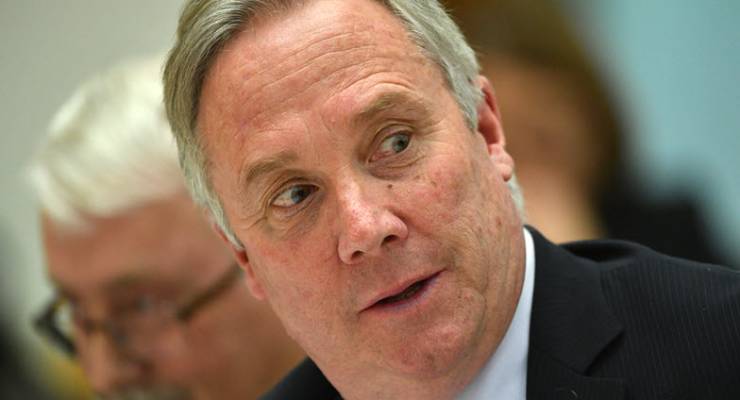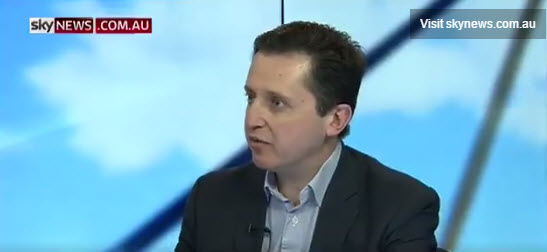
Catholic Education Commission of Victoria executive director Stephen Elder
One of the many facets of the long-running and increasingly messy fight in Parliament this week over the issue of school funding has been that, like the banks and mining companies before them, the Catholic school sector has sent in former politicians to make the case that their schools are hard done by in the so-called Gonski 2.0 legislation.
The government this week is attempting to secure passage of its “Gonski 2.0” legislation for schools funding. Labor is opposed to the legislation on the grounds that it is substantially less than what the ALP had promised under the original Gonski model, in particular for the Catholic schools sector. While the government attempts to get crossbench support, the Catholic schools have been lobbying hard both in Parliament and in the media to get more funding than that currently on the table.
The most prominent is, naturally, the National Catholic Education Commission (NCEC). This is an organisation headed up by former Labor MP for Macmillan Christian Zahra. Zahra spent his entire time in Parliament in opposition during John Howard’s tenure and left Parliament in 2004, when he lost his seat to Liberal MP Russell Broadbent. According to his speeches during his time in public office, Zahra has been consistent in his support for both public and private schooling.

Zahra was relatively young when he left Parliament and took on several directorships in the intervening years, most recently leading the indigenous social enterprise organisation Wunan Foundation.
In May this year, Zahra became the executive director of NCEC, taking up his post just a fortnight after the government announced the Gonski 2.0 funding proposal. Given his previous political career, his positioning seems less about getting the government to change its mind and more about shoring up Labor’s opposition, as well as fronting the media to make the case as to why the Catholic schools would lose out under Gonski 2.0. In announcing his appointment last month, Archbishop Timothy Costelloe, the chairman of the Bishops Commission for Catholic Education, said that Zahra would “speak clearly and passionately on behalf of Catholic school students, teachers and families”.
The other prominent spokesperson for the Catholic schools sector is Stephen Elder. Elder is the executive director of the Catholic Education Office in Victoria. Elder was a state Liberal MP until 1999, but unlike Zahra, he has been involved in the Catholic education sector since departing politics. This is possibly why Elder’s role has been more to front the parliamentary inquiry into the matter, but judging on the reaction he received from Coalition chair Bridget McKenzie, having a former Liberal MP in the position to lobby the government on behalf of the Catholic sector might not be that effective:
Elder: You are relying on a measure that it is flawed, so you keep pushing a public policy which everyone understands when they are talking about — whether it be the Grattan Institute, Gonski or Associate Professor Farish. If the model is flawed, you have to say, ‘This is bad public policy.’ You cannot say, ‘We’re going to give this amount to this school’ when–
McKenzie: Mr Elder, thank you for your commentary. You can hold a press conference after this hearing and go hammer and tongs — absolutely defend your right to do that — but here I am asking the questions.
Elder has a history of lobbying outside of the education sector, as well. In 2014 he lobbied then-minister Kevin Andrews to get rid of the Australian Charities and Not-for-profits Commission (which the government did not scrap). Now dumped from the ministry, Andrews has been one of the most vocal opponents on the backbench against the Gonski 2.0 funding arrangement for Catholic schools.
On the same side, but from a different perspective, the education unions are lobbying the Greens to block or delay the legislation as the government attempts to cut some deal with the minor parties in order to secure the funding agreement.








The Catholics may be opposing this for the wrong reasons but they are right that the SES model, that is the basis for the calculation, is flawed.
But we learn that the catholic sector are not told where they can spend money, they get vast sums and keep it for the richest areas and still charge higher and higher fees to brain wash and often molest the kids.
All schools set up to indoctrinate students in a religion are overfunded if they receive a penny. There is no way they can be “hardly done by” by loss of funding, especially if their complaint is about loss of funding secured as special deals gained through influence over governments or politicians supposed to represent all constituents.
I could not agree more.
Are they being paid now or “later”?
There are no doubt many well meaning people in catholic education, but I would trust the executive as far as I could throw them. Several groups have called for greater transparency over funding to muslim schools. Why does any private school receive public money without scrutiny, especially the catholics!
State funding of private schools is, like medical insurance subsidy, an affront to equity.
There are enough legitimate calls on taxpayer to fund the common weal without pandering to those who choose to self exclude.
If freedom means choosing a given behaviour then the concomitant is surely the responsibility to fund it.
To even allow religious indoctrination of children is child abuse – to allow, never mind fund, entire schools to do so is insane.